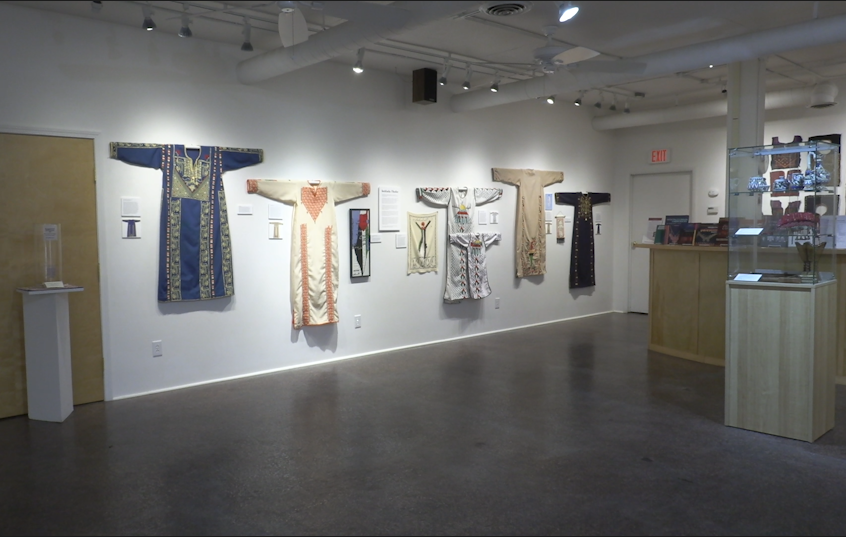VIDEO TRANSCRIPT: Syracuse art gallery showcases Palestinian resilience
Charlene Nomeny: Ebstisam El-Sharkawy, AKA Ebby, is a Palestinian-American based in Rochester. Her mother is from Alabama, and her father, from Gaza. The current violence against Gazans motivated El-Sharkawy to start collecting Thobes and Tatreez, Palestinian female dress and embroidery.
Ebtisam El-Sharkawy: And my family members lost their homes and any type of any possible. Family heirlooms we may have had, they were all lost.
Nomeny: Displaying these items is her form of aid. El-Sharkawy’s exhibition, ‘Reclaiming Our Collective Inheritance’, is on display at ArtRage gallery. Ellis Clay, a co-director at the gallery, says it’s vital for them to shine a light on the violence in Gaza.
Ellis Clay: We wanted to have a collective conversation regarding what’s occurring there, but really talk about how this is affecting the diaspora who are living in the United States.
Nomeny: The collection spans Palestine and Palestinian history. The word Intifada strikes fear into the hearts of some Americans. Translated literally it means ‘shaking off.’ But for Ebby and other Palestinians, it means resistance. And it’s what this section of the exhibition is dedicated to. El-Sharkawy says Palestinian women during the first and second Intifada, uprisings against Israeli occupation of Palestinian territory, used Thobes as a means of resistance. Take this piece, for example. Look closely at it, and you’ll notice it’s chock full of mistakes. But El-Sharkawy sees something different.
El-Sharkway: When you think about the conditions in which the stitcher was stitching that, oh, low light, grief, pain, fear of detainment, maybe they, you can only imagine what they’re going through. And then you’re like, okay, so these mistakes aren’t so surprising anymore.
Nomeny: The piece is also a lesson.
El-Sharkawy: And what you are working on is still going to be beautiful, even with those perfect little imperfections.
Nomeny: From ArtRage Gallery, I’m Charlene Nomeny, with NCC News.
SYRACUSE, N.Y. (NCC News) – Many Americans don’t think much about the clothes they wear. They’re made in factories far away and shipped to us so we stay decent, but they mean much more to many Palestinians.
Ebtisam El-Sharkawy, AKA Ebby, is a Palestinian-American based in Rochester, New York. Her mother is from Alabama, and her father is from Gaza.
“I felt like I didn’t really belong in either world. I was like in between, and it was through learning this art of Tatreez, which is the Palestinian art of embroidery, that I really felt more rooted and connected to my culture,” El-Sharkawy said.
Israeli attacks on Gaza, initially caused by Hamas’ attack on an Israeli music festival, motivated Ebby to start collecting Thobes and Tatreez. Thobes are traditional Palestinian dresses, and Tatreez is Palestinian embroidery. She purchased the items either directly from other Palestinians or “rescued them,” in her words, from secondhand retailers.
“My family members lost their homes and any type of any possible family heirlooms we may have had, they were all lost,” she said. “So this need to be able to do something beyond witnessing the destruction and the pain through my phone screen, that was why I started looking for pieces.”
Purchasing Thobes from families in refugee camps is El-Sharkawy’s method of supporting them. She’s a business analyst by trade, but after collecting a certain number of pieces, she said she felt the need to share them.
“Well, if they were in someone else’s closet, I don’t want them sitting in my closet,” she said. “If I’m a Palestinian in this diaspora who hadn’t touched or seen a hand-stitched traditional thobe in my life, and I’m 34, I’m sure there’s others who are just like me who haven’t had that tactile experience and they’re learning to stitch and it would be very special to them as well.”
Al-Sharkawy’s exhibition, ‘Reclaiming Our Collective Inheritance’, is on display at ArtRage gallery. Ellis Clay, co-director at the gallery, said it’s vital for them to shine a light on what’s happening in Gaza.
“We wanted to have a collective conversation regarding what’s occurring there, but really talk about how this is affecting the diaspora who are living in the United States,” Clay said.
Al-Sharkawy’s collection spans Palestine and Palestinian history.
The word Intifada strikes fear into the hearts of some Americans. In Arabic, it literally means ‘shaking off.’ But it’s come to mean resistance for El-Sharkawy and other Palestinians.
She said Palestinian women used Thobes as a means of non-violent resistance during the first and second Intifada, uprisings against Israeli occupation of designated Palestinian territory in 1987 and 2000. One section of her gallery is dedicated to Thobes made during these periods.

One dress stood out. The Thobe was covered in mistakes. The flags embroidered on it are uneven, some sections end early, and some flags’ colors were in the wrong order. But El-Sharkawy saw something different.
“But when you think about the conditions in which the stitcher was stitching that, oh, low light, grief, pain, fear of detainment, you can only imagine what they’re going through. And then you’re like, okay, so these mistakes aren’t so surprising anymore,” she said.
The piece also served as a lesson for El-Sharkawy.
“You can also just adapt and keep going, and what you are working on is still going to be beautiful, even with those perfect little imperfections,” she said.
El-Sharkawy is leading a tour of her collection Sunday. For more information about the exhibit, visit their website.
